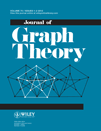
JOURNAL OF GRAPH THEORY
metrics 2024
Connecting Ideas Through Rigorous Peer Review
Introduction
JOURNAL OF GRAPH THEORY, published by WILEY, stands as a pivotal resource in the fields of Discrete Mathematics and Combinatorics, as well as Geometry and Topology. Since its inception in 1977, this esteemed journal has fostered the dissemination of influential research, currently categorized in the prestigious Q1 quartile according to the latest metrics for 2023. With an ISSN of 0364-9024 and an E-ISSN of 1097-0118, it caters to a global readership of researchers, professionals, and students dedicated to advancing their knowledge in graph theory. By maintaining a strong rank in Scopus—39th out of 106 in Geometry and Topology, and 38th out of 92 in Discrete Mathematics and Combinatorics—it reflects its significance and impact within the academic community. Although it does not offer open-access options, its rigorous peer-review process ensures that only high-quality original research is published, thus reinforcing its reputation as a leading journal in this mathematical domain.
Metrics 2024
 1.17
1.17 0.90
0.90 0.90
0.90 56
56Metrics History
Rank 2024
Scopus
IF (Web Of Science)
JCI (Web Of Science)
Quartile History
Similar Journals

Aequationes Mathematicae
Exploring the Depths of Discrete Mathematics and Combinatorics.Aequationes Mathematicae is a distinguished academic journal published by SPRINGER BASEL AG, focusing on the dynamic fields of Applied Mathematics, Discrete Mathematics, and Combinatorics. Since its inception in 1968, the journal has served as a vital platform for disseminating high-quality research, with Converged Years expected to extend to 2024. With an impressive Q2 ranking in multiple mathematical disciplines as of 2023, Aequationes Mathematicae is positioned within the top half of its field, reflecting its reputation for excellence. Spanning the globe from its base in Basel, Switzerland, this journal is ideal for researchers, professionals, and students seeking to advance their knowledge and contribute to ongoing discussions within mathematics. While it does not currently offer Open Access options, readers can still access an extensive archive of impactful studies that bolster its standing within the academic community.
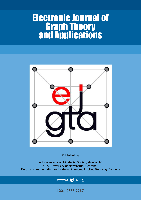
Electronic Journal of Graph Theory and Applications
Fostering collaboration in the dynamic world of graph theory.The Electronic Journal of Graph Theory and Applications, published by Institut Teknologi Bandung, is a prominent open-access journal since 2013, dedicated to the dynamic field of graph theory and its various applications. With an ISSN of 2338-2287 and an impressive categorization in 2023, the journal stands at Q2 in both Applied Mathematics and Discrete Mathematics and Combinatorics, reflecting its growing influence and recognition within the academic community. With its geographical base in Bandung, Indonesia, the journal seeks to provide researchers, professionals, and students with a platform to disseminate innovative research and applications, bridging gaps in both theoretical and practical domains. The Scopus rankings further establish its commitment to excellence, notable as Rank #54/92 in Discrete Mathematics and Combinatorics and Rank #473/635 in Applied Mathematics. By facilitating open access to high-quality research, the Electronic Journal of Graph Theory and Applications significantly contributes to advancing scholarship and encourages diverse perspectives within the field.

Annals of Combinatorics
Pioneering Insights in Combinatorial ResearchAnnals of Combinatorics, published by Springer Basel AG, serves as a premier platform for innovation and research in the field of discrete mathematics and combinatorics. With an ISSN of 0218-0006 and an E-ISSN of 0219-3094, the journal captures the ongoing developments and breakthroughs that characterize this dynamic discipline, which plays a crucial role in various applications such as computer science, optimization, and statistical mechanics. The journal has been recognized as part of the Q2 category in the 2023 rankings for discrete mathematics and combinatorics, reflecting its significant contribution to the academic community. Researchers and educators alike benefit from its insightful articles that not only cover theoretical advancements but also practical implications. With convergence years spanning from 2005 to 2024, the Annals of Combinatorics continues to be an essential resource for anyone looking to deepen their understanding and explore new frontiers in combinatorial research.

Periodica Mathematica Hungarica
Advancing Mathematical Frontiers, One Study at a Time.Periodica Mathematica Hungarica is a prestigious academic journal published by Springer, focusing on the field of mathematics, with a particular emphasis on miscellaneous mathematical studies. Established in 1971, this journal has maintained its commitment to advancing mathematical research and its applications, making significant contributions over its converged years through 2024. With a Q2 ranking in the mathematics category as of 2023, it establishes itself as a vital resource within the mathematical community. Researchers and academics will find its inclusion in the Scopus database, ranking #189 out of 399 in general mathematics, indicative of its impact and relevance. Although it does not feature open access, the journal provides a wealth of high-quality peer-reviewed articles, thereby serving as an essential platform for the dissemination of innovative mathematical theories, methodologies, and findings. Engaging with the content of Periodica Mathematica Hungarica is crucial for anyone looking to stay at the forefront of mathematical research and development.

Contributions to Discrete Mathematics
Advancing the frontiers of discrete mathematics.Contributions to Discrete Mathematics, published by the Department of Mathematics and Statistics at the University of Calgary, serves as a vital platform for disseminating innovative research within the dynamic field of discrete mathematics and combinatorics. Established in 2008, this journal has rapidly gained recognition, currently holding a Q3 classification in discrete mathematics and combinatorics for 2023. As it aims to foster academic dialogue and share groundbreaking discoveries, the journal showcases high-quality peer-reviewed articles that cover a range of topics, from theoretical explorations to practical applications. Although it currently operates under a traditional subscription model, there is a growing commitment to enhancing access options, ensuring that critical knowledge is available to researchers and practitioners alike. With its notable Scopus ranking of #50 out of 92 within its category, this journal is positioned as an important resource for students, academics, and industry professionals who seek to stay at the forefront of discrete mathematics research.
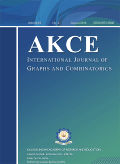
AKCE International Journal of Graphs and Combinatorics
Connecting Ideas through Innovative Mathematical Research.AKCE International Journal of Graphs and Combinatorics, published by TAYLOR & FRANCIS LTD, serves as a significant platform in the field of Discrete Mathematics and Combinatorics. With its commitment to open access since 2015, the journal ensures that cutting-edge research is readily available to a global audience, promoting the dissemination of knowledge and high-quality scholarship. Recognized for its impact in the discipline, the journal is currently ranked Q3 in its category for 2023 and holds a commendable Scopus ranking, falling within the 69th percentile. Researchers, professionals, and students alike will find invaluable insights and contributions in this journal, which spans a wide range of topics related to graph theory and combinatorial structures. Operating from its base in India, and converging from 2011 to 2024, the AKCE International Journal invites submissions that push the boundaries of mathematical exploration and foster innovative methodologies in a rapidly evolving field.

CANADIAN JOURNAL OF MATHEMATICS-JOURNAL CANADIEN DE MATHEMATIQUES
Fostering collaboration and innovation in mathematics.Canadian Journal of Mathematics - Journal Canadien de Mathématiques is a prestigious peer-reviewed journal published by Cambridge University Press, which aims to advance the field of mathematics through the dissemination of high-quality research articles. With its ISSN 0008-414X and E-ISSN 1496-4279, the journal plays a pivotal role in fostering mathematical research and collaboration. It has been recognized for its impactful contributions, currently holding a category quartile ranking of Q2 in Mathematics (miscellaneous) for 2023 and sits in the 66th percentile among its peers according to Scopus rankings. As the journal continues its convergence from its inception in 1994 through to 2024, it remains a vital resource for researchers, professionals, and students seeking to stay at the forefront of mathematical developments. The journal does not operate under an open access model, allowing for a curated collection of articles that adhere to rigorous academic standards.
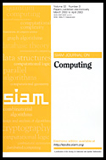
SIAM JOURNAL ON COMPUTING
Exploring Theoretical Breakthroughs in Computing.Welcome to the SIAM Journal on Computing, a premier publication of SIAM Publications dedicated to advancing the field of computational science. Established in 1984, this journal provides a platform for groundbreaking research and theoretical advancements that shape the landscape of both Computer Science and Mathematics. With an impressive impact factor and consistently ranking in Q1 quartiles for its categories, the journal remains an essential resource for scholars looking to contribute to innovative computational theories and methodologies. Although not currently an open-access journal, the SIAM Journal on Computing offers rigorous peer-reviewed articles, ensuring high-quality contributions that appeal to researchers, professionals, and students alike. As we converge towards 2024, this journal continues to play a vital role in influencing future research directions and fostering an academic community devoted to the exploration of computational challenges. Join us in exploring the forefront of computing research!

COMBINATORICA
Fostering Innovation in Discrete Mathematics ResearchCOMBINATORICA, published by Springer Heidelberg, is a leading international journal dedicated to advancing the fields of Discrete Mathematics and Combinatorics. With an illustrious history dating back to 1981 and a remarkable commitment to excellence, this journal has earned its place in the highest echelons of academic publishing, currently ranked in the Q1 category for both Computational Mathematics and Discrete Mathematics and Combinatorics. Located in Germany and recognized for its high-quality research contributions, COMBINATORICA fosters innovative discussions and disseminates significant findings that shape contemporary mathematical theory. Although it does not offer Open Access options, its rigorous peer-review process ensures that each publication meets the highest scholarly standards, making it an essential resource for researchers, professionals, and students engaged in mathematical sciences. With an impactful H-Index reflecting its citation influence, COMBINATORICA continues to be a pivotal platform for groundbreaking research in combinatorics and its applications.
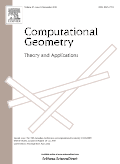
COMPUTATIONAL GEOMETRY-THEORY AND APPLICATIONS
Pioneering Research in Geometry and Its ApplicationsCOMPUTATIONAL GEOMETRY - THEORY AND APPLICATIONS is a premier academic journal published by Elsevier, specializing in the interdisciplinary field of computational geometry. Since its inception in 1991, this journal has had a significant influence on the advancement of computational mathematics, offering a platform for innovative research that explores the theoretical and applied aspects of geometry and its applications in various scientific domains. With a 2023 impact factor placing it in the Q2 category for Computational Mathematics and Geometry and Topology, researchers can trust the rigor and relevance of the work published here. While the journal does not currently offer an open-access option, it remains highly influential, ranked in the mid-range percentile across multiple categories including Computational Theory and Mathematics and Control and Optimization. Therefore, it serves as an invaluable resource for researchers, professionals, and students passionate about pushing the boundaries of knowledge in computational geometry and its myriad applications. The ongoing publication commitments extend until 2025, further solidifying its role in shaping the future of this dynamic field.